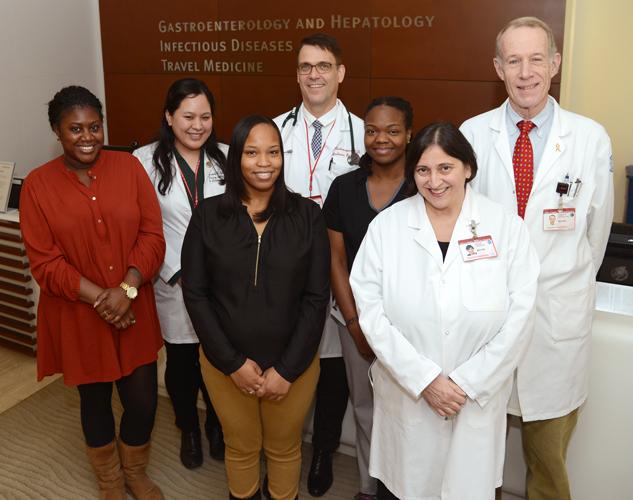Whether planning to travel for pleasure, work, or embarking on a humanitarian mission, it is vital to make a "first stop" with a travel medicine expert prior to leaving in order to ensure a safe and healthy trip. Since its inception in 1980, the Division of Infectious Diseases has been home to a premier clinic that serves this purpose. In fact, Weill Cornell Travel Medicine (WCTM) was the first of its kind in all of the United States. Its co-founder, Dr. Henry W. Murray, Arthur R. Ashe Jr. Professor of Medicine at Weill Cornell Medicine, still sees travelers and reminisces: "At the time we founded the clinic there was no place in New York City where one could find out about required or recommended vaccines and receive the necessary shots before a trip, or, if needed, receive care after travel."

The Weill Cornell Travel Medicine Team
Recognized nationally and internationally, WCTM has counseled thousands of travelers over the decades, providing services for a wide range of clients during normal business as well as evening hours. In 2013, Dr. Ole Vielemeyer, who trained in infectious diseases with a special interest in tropical and travel medicine, was recruited from Drexel University College of Medicine to assume the role of Medical Director of ID Associates and Weill Cornell Travel Medicine. He and his entire WCTM team are located on the 4th floor of the Weill Greenberg Building on 1305 York Avenue, across from Weill Cornell Medical School. For each client, WCTM will conduct a thorough risk assessment, give needed routine and travel-specific vaccines, prescribe medications, and offer up-to-the-minute travel advice for both adults and children. WCTM also serves as a training ground for infectious disease fellows from both NewYork-Presbyterian Hospital/Weill Cornell Medical Center and Memorial Sloan-Kettering Cancer Center.
The WCTM team is highly experienced in working with international travelers who have a broad range of itineraries. Clients may be going on a business trip, spending most of their time in meeting rooms, or be fulfilling a lifelong dream of going on a safari in Kenya. Others may be leaving for South East Asia to help build houses, to watch birds in Namibia, to work in refugee camps of East Africa, or to rescue animals in remote parts of India. "Making travel safer," says Dr. Vielemeyer, "is one way to help broaden our collective understanding of peoples all around the world. I think it is important to learn about new cultures first-hand, not only by visiting famous sites, but also by struggling through communication attempts in foreign languages and by eating strange-looking food. By traveling the world, we will find that people are much more similar than we think. Ultimately, we will understand ourselves better and hopefully grow more tolerant of one another."
There is an extensive list of health threats that the international traveler may face, ranging from mosquito-borne illnesses like Dengue fever, yellow fever and malaria, to food- and water-borne illnesses that are so common among tourists that they have inspired the coining of colloquial terms, such as "Aztec two step" or "Bombay belly." More recently, the Ebola and MERS (Middle Eastern Respiratory Syndrome) viruses had to be added to the list for certain destinations. Changes in those and other health risks are closely monitored by the WCTM clinic staff, allowing for up-to-date advice for each traveler. Furthermore, WCTM is equipped to provide seamless follow-up care, giving guidance to clients while abroad and/or post-travel clinic visits if needed.
In anticipation of any potential travel-related risk, the WCTM team will assess the overall health status of the traveler and then carefully review his or her itinerary, specific destination, length-of-stay, level of planned physical exertion during the trip, etc. Once reviewed, they then prescribe – if indicated – medications for the prevention of altitude sickness and/or malaria and may give advice, ranging from how to manage a long flight to safety tips during and after scuba diving. "Ideally, it is recommended that clients be seen in our clinic at least 6 weeks prior to departure" explains Dr. Vielemeyer. "While most vaccines will be effective two weeks after one dose, some, like Hepatitis B and Japanese Encephalitis, require two doses, 28 days apart, prior to traveling."
Although the majority of clients seen at WCTM are healthy, more and more people with serious health conditions and/or a compromised immune system are traveling today. "In our clinic, which is integrated into the larger Weill Cornell Medicine physician network," explains Dr. Vielemeyer, "this latter group will receive a thorough evaluation and individualized counseling based on the uniqueness of their medical condition and travel destination. In many cases live vaccines will not be given." Aside from the traveler's health status, the length of a planned trip is another important factor in the risk assessment. "The exposure risk to most diseases increases with time, and often more shots are needed when staying for six-twelve months, as compared to the typical two-three week vacation."
All medical providers (nurses, nurse practitioners and physicians) working at the WCTM are not only seeing travelers but remain active in taking care of patients in the in- and outpatient setting. WCTM physicians are engaged in research and medical education. All this adds to the wealth of expertise and allows for a better understanding of the full spectrum of infectious diseases as it pertains to travel medicine. The clinic sees adults and children above the age of 6 and accepts most major insurance plans to allow for at least partial coverage of services provided as regards the individual insurance policy.

